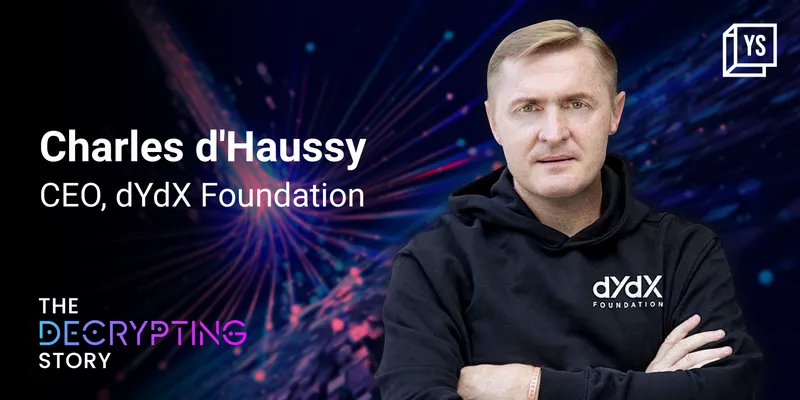India in focus for dYdX Foundation as decentralised crypto platform gears up for mainnet
As dYdX gears up for the launch of its standalone blockchain network, the decentralised crypto trading firm's foundation wants to tap into India’s vibrant Web3 talent.
After joining the decentralised crypto exchange dYdX's Foundation in October last year, Charles d’Haussy, the CEO of the foundation, set out to achieve a set of ambitious goals.
Headquartered in Zug, Switzerland, the dYdX Foundation is entrusted with the responsibility of fostering decentralised infrastructure and governance on the dYdX platform.
Not only was the foundation and its CEO tasked with supporting the transition of dYdX into a fully decentralised entity, but d'Haussy and his team also had to support and boost community building and governance on dYdX.
He realised that growing the dYdX community and talent pool across geographies, including India, was crucial to achieving both goals.
With the team at dYdX Foundation identifying that India would play a key role in its future plans, the foundation recently launched its India chapter, led by Karan Ambwani.
Grassroots initiatives
Through the India chapter, d’Haussy and Ambwani have been interacting with the domestic Web3 community at the grassroots level through research efforts, community engagement, thought leadership activities, and more.
“Our India initiatives are about amplifying the organic community growth we’ve already seen from here. We see a strong product-community fit here,” d’Haussy tells The Decrypting Story.
dYdX Foundation recently released a research report that said there is a growing DeFi (decentralised finance) ecosystem in India.
“We believe that, with rising internet penetration, India has all the necessary components to help us build a robust DeFi community,” says d’Haussy.
dYdX Foundation wants India’s vibrant ecosystem of technical and non-technical Web3 talent to become a larger part of its community and eventually contribute to governance on the platform.

Decentralising decision-making
dYdX is a leading decentralised exchange by 24-hour trading volume. Alongside Uniswap, it is usually among the top two decentralised exchanges on CoinMarketCap and sees trading volumes of hundreds of millions of dollars each day.
At the time of writing this article, CoinMarketCap data had clocked dYdX’s 24-hour trading volume at $442 million, marginally behind Uniswap V3 at $492 million.
A core philosophy of Web3 is decentralisation—and one part of this philosophy is about preventing a small group of influential stakeholders from exercising all the decision-making power.
Since its establishment in 2019, dYdX has been progressively decentralising itself in an effort to remain true to the community-driven, democratic ethos of Web3.
dYdX has already shifted, to a large extent, the decision-making power from the company to the community of participants.
dYdX’s communities are represented by its decentralised autonomous organisations (DAOs)— its operations subDAO and grants subDAO.
In these, dYdX community members come together to collaborate, build, learn, contribute, and eventually become a part of the decision-making process for dYdX.
With the shift in the decision-making process, the responsibility of governing a Web3 entity would fall into the hands of its community of participants and users.
However, building a robust community of active contributors takes time.
Therefore, decentralised governance does not tend to work from day one. Web3 projects ideally start as centralised projects, and, as their network grows, they progressively decentralise over time.
India focus
d’Haussy believes, with the growth of dYdX’s app and DAOs, there is a need for a diverse set of talent to join the foundation's network. And this is why it is eyeing talent from India.
“In India, there is a wide spectrum of talent across finance, go-to-market, community building, etc. We cannot afford to miss the best Indian talent from these fields,” he says.
Ambwani believes India’s contributions to the global Web3 sector is another reason why dYdX Foundation cannot ignore the country.
“Even beyond the likes of Polygon, we’ve seen Push Protocol (previously EPNS), Biconomy, and several other Indian Web3 projects successfully building for the world. We want to support and nurture such talent,” he says.
According to a 2022 NASSCOM report, 11% of the world’s Web3 talent is in India. dYdX Foundation expects India’s contribution to Web3 to grow significantly in the days to come.

Crypto exchange CoinDCX launches DeFi wallet with cognitive AI tech
A safer option?
The foundation's entry into the country comes at a time when the Indian crypto sector is facing a challenging business environment.
Presently, India’s crypto market is in a state of flux.
On one hand, the 2021-22 bull market revealed that millions of Indians are interested in buying and trading crypto. The likes of WazirX, CoinDCX, Coinswitch Kuber, ZebPay, and BitBNS, among others, flourished during this period.
On the other hand, heavy taxation on domestic crypto transactions pushed all action onto international crypto exchanges last year. The fall of FTX has also shaken people’s faith in centralised crypto exchanges.
These factors have led to uncertainty around the future of India’s centralised crypto exchanges.
Contrary to centralised crypto exchanges, decentralised exchanges promise to create a safer and more seamless and predictable crypto experience.
This is because decentralised exchanges allow users to directly and anonymously transact with each other. They also do not have a singular point of failure—a feature that was highlighted in the alarming corporate governance issues that caused FTX’s downfall.
Therefore, do DEXs like dYdX present a safer alternative in India’s crypto market?
To some degree, yes, but it is not so straightforward. dYdX's trading platform is separate from dYdX Foundation, and the foundation is a non-profit. Further, many Web3 entities position their products and services as public goods.
These public goods, which are built on the principles of financial inclusion, transparency and fairness, typically do not want to be seen as aggressively grabbing market share from other types of crypto services.
“From day one, many components of dYdX's upcoming V4 product will be designed as public goods for transparently trading crypto assets. We want to show people they can anchor their trust in digital assets that are traded on decentralised infrastructure,” says d’Haussy.
“By design, such infrastructure is publicly auditable and transparent. We believe this is a formula that will win in the long run. So, we want to amplify our organic growth and not push too hard in the short term.”
With dYdX and its foundation sticking to its long-term bet on decentralised crypto infrastructure, it intends to focus on building its community.
dYdX Foundation wants to slowly but surely spread awareness and bring more people into the Web3 fold, and into its DAOs, from where people can collectively define the future of dYdX.
“We want to be seen as a leader among DAOs, and we are building the brand around educating people around the permissionless nature of building and working in DAOs,” says d’Haussy.
“More people are getting involved in DeFi every day. People are not just interacting at the centralised exchange level, but through proper Web3 education, they are also participating in DAO governance,” says Ambwani.

Taking dYdX mainstream
dYdX believes its platform should be scalable, efficient and easy to use. Further, one way to boost mainstream adoption is integrating it into popular financial service products and services, instead of being a standalone platform.
These are discrete problem statements, and dYdX is addressing them separately.
For the first part— building a platform that can be scaled to serve hundreds of millions of users—it is necessary to have full control over its product.
Currently, dYdX is built on Starkware, an Ethereum-based platform that focuses on bringing privacy to blockchain transactions.
As such, dYdX’s performance is subject to the benefits and limitations of a third party, i.e., Starkware. In order to create a fully customised, scalable product, it needs to build its own blockchain.
This is already in the works. In June 2022, dYdX founder Antonio Juliano announced that the company is developing a standalone blockchain that is fully customised for dYdX’s needs.
Dubbed V4, the new dYdX platform will be part of the Cosmos ecosystem, a network or ‘internet of blockchains’.
As a separate Cosmos network, dYdX’s community can have full control over the governance of its stack and facilitate crypto asset trading without having to transact on top of congested, mainstream chains.
“Given the size of the potential audience from India, it is necessary to be able to use Web3 tech at scale and on our own chain. We believe that these app-specific chains can be successful for Web3 communities that have large participation from India,” d’Haussy explains.
In the coming weeks, dYdX will launch its public testnet, which a number of participants can start using and testing before the firm rolls out its mainnet – a fully-functional, public blockchain network–by the end of September this year.
In the future, dYdX may be accessible via other apps through integrations with existing financial service apps in the country.
“For many years, banks have been acting as aggregators of financial services, such as deposits, insurance, credit, etc. Going forward, we envision the next wave of integration of financial services to potentially include dYdX’s services as well,” d’Haussy says.
“This phenomenon could happen sooner than we think.”
In the coming months, as dYdX inches closer to the launch of its own blockchain network, it will remain focussed on India, among other countries, to drive its community-building efforts.
(The copy has been updated to provide clarity on the distinction between dYdX and dYdX Foundation.)
Edited by Swetha Kannan







